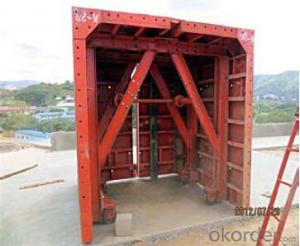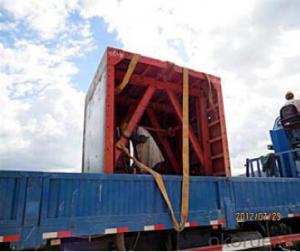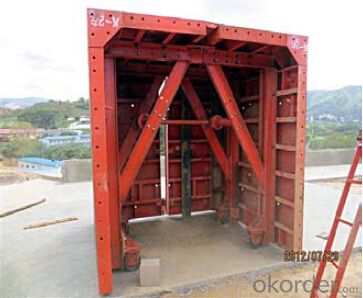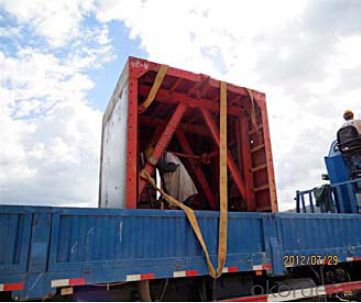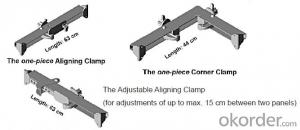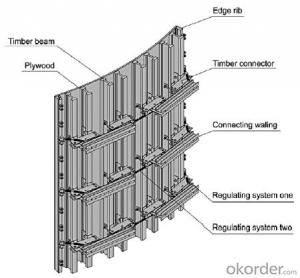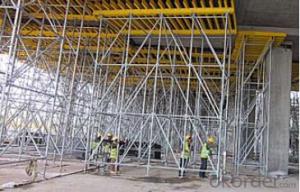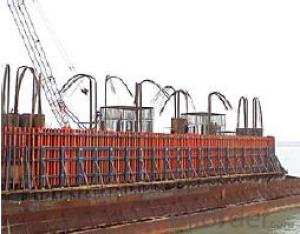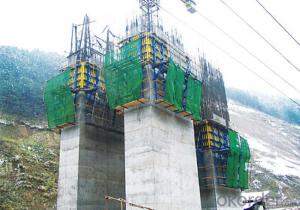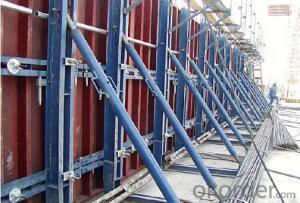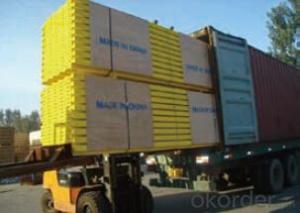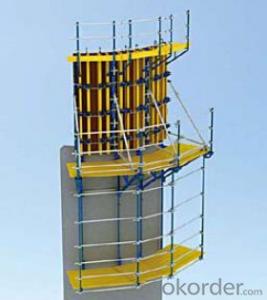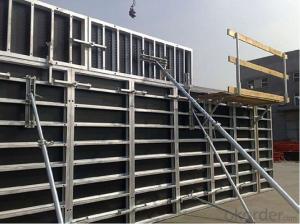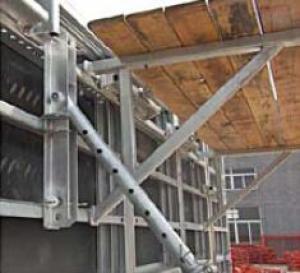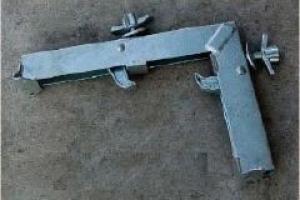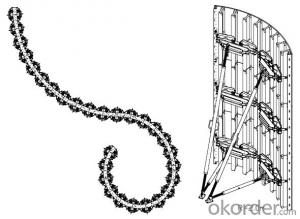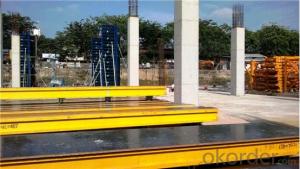Steel Tunnel for Formwork and Scaffolding Systems
- Loading Port:
- Tianjin
- Payment Terms:
- TT OR LC
- Min Order Qty:
- 50 m²
- Supply Capability:
- 1000 m²/month
OKorder Service Pledge
Quality Product, Order Online Tracking, Timely Delivery
OKorder Financial Service
Credit Rating, Credit Services, Credit Purchasing
You Might Also Like
Building Tunnel Formwork:
A compositional steel formwork system mainly used in the building which has regular structure
without beams, the excellent formwork system can make the integral pouring for the wall & slab
easily achieved.
Characteristics:
◆ High stiffness, make perfect shape for concrete.
◆ Easy operation, save labor and force.
◆ Fast forming, repeatedly turnover.
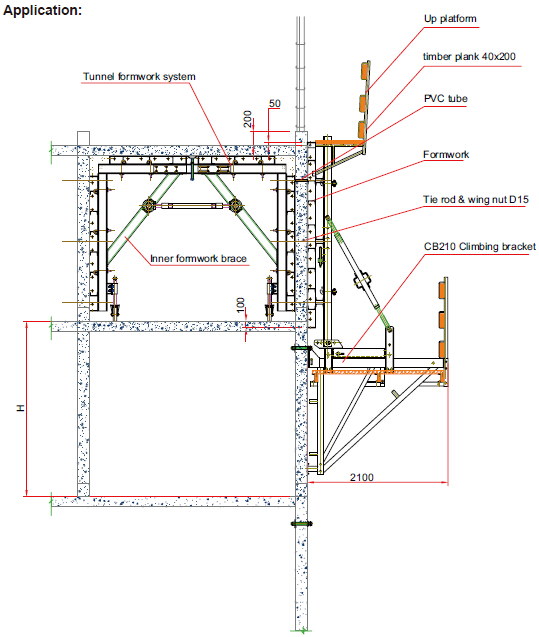
- Q: How does steel formwork impact the overall cost of a construction project?
- Steel formwork can impact the overall cost of a construction project by increasing initial expenses due to higher material costs. However, it offers long-term cost benefits through its durability, reusability, and reduced labor requirements. The strength and stability of steel formwork result in fewer repairs and replacements, leading to decreased maintenance expenses. Additionally, its ability to be used multiple times reduces the need for purchasing new formwork for future projects, ultimately lowering overall construction costs.
- Q: What are the common design considerations for steel formwork in seismic areas?
- To ensure the safety and stability of structures in seismic areas, there are several important factors to consider when designing steel formwork. These factors include: 1. Material strength: It is crucial to use steel with high tensile strength and ductility to withstand seismic forces. Utilizing high-strength steel, like Grade 60 or Grade 80, is often necessary to ensure the formwork can endure the lateral forces generated during earthquakes. 2. Connection details: The connections between different components of the steel formwork must be meticulously designed to withstand seismic loads. Employing proper welding or bolting techniques is essential to ensure the connections are strong enough to resist dynamic forces. 3. Reinforcement: To enhance the structural integrity of the formwork, additional reinforcement such as steel bars or mesh may be required. This reinforcement helps distribute seismic forces and prevents the formation of weak points or failure zones. 4. Stiffness and rigidity: The formwork system should be designed to be adequately stiff and rigid, minimizing deformations and preventing excessive movement during earthquakes. This can be achieved by using thicker steel plates or incorporating diagonal bracing elements to increase overall stiffness. 5. Anchorage and support: To prevent shifting or collapsing during seismic events, the formwork needs to be securely anchored to the ground or supporting structure. Incorporating adequate anchorage and support systems, such as anchor bolts or braces, into the design is crucial for formwork stability. 6. Compatibility with other building components: Consideration must be given to the compatibility of the steel formwork with other structural elements, such as concrete walls or columns. Proper coordination and integration with other building components are essential for overall stability and seismic performance. 7. Robustness and redundancy: The formwork design should incorporate features that provide redundancy and robustness, enabling it to withstand unexpected loading conditions or localized damage during earthquakes. This can be achieved by incorporating multiple load paths or redundant structural elements into the formwork system. In summary, the design considerations for steel formwork in seismic areas revolve around ensuring strength, stability, and compatibility with other components. By addressing these factors, engineers can develop robust and resilient formwork designs that contribute to the overall seismic safety of the structure.
- Q: What are the common applications of steel formwork?
- Steel formwork finds widespread use in the construction industry for a variety of purposes. Several typical applications of steel formwork are as follows: 1. Concrete construction: Steel formwork is commonly employed to cast concrete structures such as walls, slabs, columns, and beams. It offers a sturdy and rigid framework that holds the concrete in place until it solidifies and achieves sufficient strength. 2. High-rise buildings: Due to its durability and strength, steel formwork is frequently utilized in the construction of tall buildings. It can withstand the pressure and weight of the concrete, ensuring the stability and safety of the structure. 3. Bridges and tunnels: Steel formwork is also employed in building bridges and tunnels. It allows for the precise shaping of concrete elements like piers, abutments, and tunnel linings, guaranteeing the structural integrity and functionality of these infrastructure projects. 4. Industrial structures: The extensive use of steel formwork can be observed in the construction of industrial facilities such as factories, warehouses, and power plants. It provides a robust framework capable of withstanding heavy loads and adverse working conditions. 5. Water retaining structures: Constructing water tanks, reservoirs, and swimming pools often involves the use of steel formwork. It ensures accurate pouring and curing of the concrete to prevent any water leakage or seepage. 6. Architectural features: Steel formwork is also employed to create intricate architectural features like decorative facades, curved walls, and unique shapes. Its flexibility allows for precise molding and shaping of concrete to achieve the desired design aesthetics. 7. Infrastructure projects: Steel formwork is indispensable for various infrastructure projects such as dams, tunnels, culverts, and retaining walls. It provides a sturdy framework that supports the concrete during construction, ensuring the long-term stability and functionality of these structures. In summary, steel formwork is an integral part of the construction industry, offering a reliable and efficient method for casting concrete structures in a wide range of applications. Its strength, durability, and flexibility make it a popular choice for numerous construction projects.
- Q: How does steel formwork affect the overall project cost?
- Steel formwork can affect the overall project cost in a few ways. Firstly, steel formwork tends to have a higher initial cost compared to other types of formwork materials such as timber or plastic. However, this cost can be offset by the fact that steel formwork is more durable and reusable, resulting in lower long-term costs for future projects. Additionally, steel formwork offers greater precision and stability, which can lead to faster construction times and reduced labor costs. Overall, while the initial investment may be higher, steel formwork can contribute to overall cost savings and improved project efficiency in the long run.
- Q: What are the considerations when designing steel formwork for underground parking structures?
- When designing steel formwork for underground parking structures, several key considerations should be taken into account. Firstly, the formwork must be able to withstand the heavy loads and pressures exerted by the surrounding soil and any potential water infiltration. It is crucial to ensure the strength, stability, and durability of the formwork system to prevent any structural failures or collapses. Additionally, careful attention should be paid to the formwork's waterproofing capabilities. Adequate waterproofing measures, such as the use of sealants or membranes, must be incorporated to protect the structure against potential water ingress, which could lead to corrosion and long-term damage. Moreover, the design should allow for efficient and safe construction. This includes considering factors such as ease of assembly and disassembly, ensuring proper access and working space for construction workers, and incorporating appropriate safety measures to prevent accidents during the formwork installation and removal processes. Lastly, the formwork design should also take into consideration the desired architectural and aesthetic elements of the parking structure. This may involve incorporating specific finishes, textures, or patterns on the exposed concrete surfaces, which can enhance the overall visual appeal of the underground parking facility. Overall, the considerations when designing steel formwork for underground parking structures revolve around ensuring structural integrity, waterproofing capabilities, construction efficiency, safety, and meeting the desired architectural requirements.
- Q: Can steel formwork be used for both slab and beam construction?
- Yes, steel formwork can be used for both slab and beam construction. Steel formwork is a versatile and durable option for constructing both slabs and beams in the construction industry. It provides a strong and rigid framework that can withstand the weight and pressure of concrete being poured into it. Steel formwork can be easily assembled and disassembled, making it suitable for various construction projects. Its strength and stability make it an ideal choice for both slab and beam construction, ensuring that the concrete structures are built to the required specifications and can support the loads they are designed for.
- Q: What are the different sizes and dimensions of steel formwork?
- Steel formwork is available in various sizes and dimensions to cater to different construction requirements and project needs. The most common sizes of steel formwork panels are typically 2 meters (6.5 feet) in height and 1 meter (3.2 feet) in width. However, these dimensions can vary depending on the manufacturer and the specific project requirements. In terms of thickness, steel formwork panels are usually between 12 to 14 millimeters (0.5 to 0.6 inches) thick. This thickness ensures the panels are sturdy enough to withstand the pressure exerted by the concrete during the pouring and curing process. Additionally, steel formwork panels are available in various lengths to accommodate different wall heights and dimensions. These lengths can range from 1 meter (3.2 feet) to 4 meters (13.1 feet) or even longer, depending on the project requirements. Apart from panels, steel formwork systems also include other components such as beams, props, adjustable struts, and connectors. These components come in different sizes and dimensions to support the formwork structure and ensure stability and safety during the construction process. It is important to note that the dimensions and sizes of steel formwork can vary depending on the manufacturer, project specifications, and regional construction practices. Therefore, it is crucial to consult with the manufacturer or a structural engineer to determine the appropriate sizes and dimensions of steel formwork required for a specific construction project.
- Q: What are the considerations when designing steel formwork for retaining walls?
- When designing steel formwork for retaining walls, several considerations need to be taken into account. First, the formwork should be strong enough to withstand the pressure exerted by the wet concrete, ensuring it does not collapse or deform during the pouring process. Additionally, the formwork should be able to resist the lateral pressure exerted by the soil behind the retaining wall. Proper bracing and reinforcement are crucial to ensure stability. The formwork should also be designed to allow for easy removal once the concrete has cured, considering factors such as the type of release agent used and the desired finish of the wall. Lastly, considerations should be given to factors such as cost, time, and ease of assembly and disassembly, as these can impact the overall efficiency and effectiveness of the formwork.
- Q: How does steel formwork affect the overall construction site waste recycling?
- The overall waste recycling at a construction site can be greatly influenced by steel formwork. In contrast to traditional timber formwork, steel formwork is more long-lasting and can be reused multiple times. This results in a decrease in waste production at the construction site since there is less necessity for the production and disposal of new formwork materials. Furthermore, cleaning and maintaining steel formwork is simpler, which extends its lifespan and reduces the need for replacement. This not only decreases waste but also saves costs associated with purchasing new formwork materials for each construction project. Moreover, steel formwork is highly recyclable. Once its life cycle is complete, it can be recycled and utilized to manufacture new steel products, diminishing the demand for fresh materials and reducing the environmental impact. Through the utilization of steel formwork, construction sites can greatly diminish their waste generation and contribute to a more sustainable construction industry. This not only benefits the environment but also promotes a more efficient and cost-effective approach to construction.
- Q: How does steel formwork affect the overall construction site productivity?
- Steel formwork can greatly enhance the overall construction site productivity. Its robustness and durability allow for multiple reuses, reducing the need for frequent replacements and saving time and resources. The precise dimensions and smooth surfaces of steel formwork also contribute to faster assembly and disassembly, enhancing the efficiency of the construction process. Additionally, steel formwork enables the construction of complex structures with greater accuracy and consistency, resulting in reduced errors, rework, and delays. Overall, the use of steel formwork positively impacts productivity by streamlining operations, minimizing downtime, and improving construction quality.
Send your message to us
Steel Tunnel for Formwork and Scaffolding Systems
- Loading Port:
- Tianjin
- Payment Terms:
- TT OR LC
- Min Order Qty:
- 50 m²
- Supply Capability:
- 1000 m²/month
OKorder Service Pledge
Quality Product, Order Online Tracking, Timely Delivery
OKorder Financial Service
Credit Rating, Credit Services, Credit Purchasing
Similar products
Hot products
Hot Searches
Related keywords
